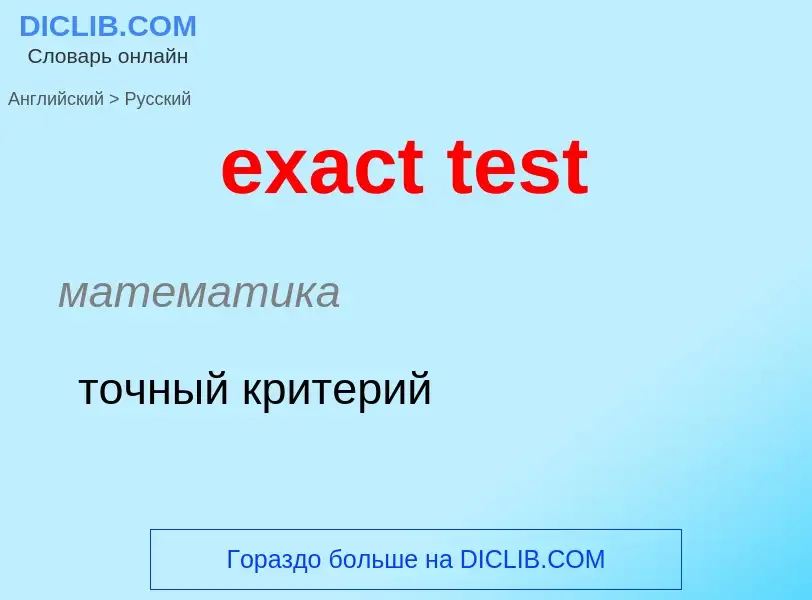Перевод и анализ слов искусственным интеллектом ChatGPT
На этой странице Вы можете получить подробный анализ слова или словосочетания, произведенный с помощью лучшей на сегодняшний день технологии искусственного интеллекта:
- как употребляется слово
- частота употребления
- используется оно чаще в устной или письменной речи
- варианты перевода слова
- примеры употребления (несколько фраз с переводом)
- этимология
exact test - перевод на русский
математика
точный критерий
[ig'zækt'saiənsiz]
общая лексика
точные науки
математика
точная категория
медицина
реакция Манту
медицина
непрямая проба Кумбса
медицина
прямая проба Кумбса
Определение
Википедия
In statistics, an exact (significance) test is a test such that if the null hypothesis is true, then all assumptions made during the derivation of the distribution of the test statistic are met. Using an exact test provides a significance test that maintains the type I error rate of the test () at the desired significance level of the test. For example, an exact test at a significance level of , when repeated over many samples where the null hypothesis is true, will reject at most of the time. This is in contrast to an approximate test in which the desired type I error rate is only approximately maintained (i.e.: the test might reject > 5% of the time), while this approximation may be made as close to as desired by making the sample size sufficiently large.
Exact tests that are based on discrete test statistics may be conservative, indicating that the actual rejection rate lies below the nominal significance level . As an example, this is the case for Fisher's exact test and its more powerful alternative, Boschloo's test. If the test statistic is continuous, it will reach the significance level exactly.
Parametric tests, such as those used in exact statistics, are exact tests when the parametric assumptions are fully met, but in practice, the use of the term exact (significance) test is reserved for non-parametric tests, i.e., tests that do not rest on parametric assumptions. However, in practice, most implementations of non-parametric test software use asymptotical algorithms to obtain the significance value, which renders the test non-exact.
Hence, when a result of statistical analysis is termed an “exact test” or specifies an “exact p-value”, this implies that the test is defined without parametric assumptions and is evaluated without making use of approximate algorithms. In principle, however, this could also signify that a parametric test has been employed in a situation where all parametric assumptions are fully met, but it is in most cases impossible to prove this completely in a real-world situation. Exceptions in which it is certain that parametric tests are exact include tests based on the binomial or Poisson distributions. The term permutation test is sometimes used as a synonym for exact test, but it should be kept in mind that all permutation tests are exact tests, but not all exact tests are permutation tests.



![The size of [[induration]] is measured 48–72 hours later. Erythema (redness) should not be measured. The size of [[induration]] is measured 48–72 hours later. Erythema (redness) should not be measured.](https://commons.wikimedia.org/wiki/Special:FilePath/Mantoux test.jpg?width=200)

.png?width=200)

